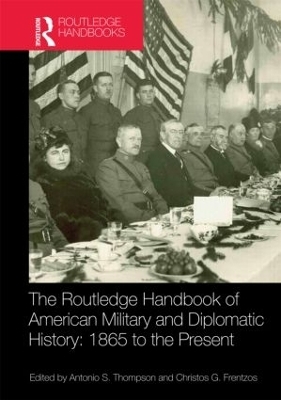
The Routledge Handbook of American Military and Diplomatic History
Routledge (Verlag)
978-0-415-88847-9 (ISBN)
With authoritative and vividly written chapters by both leading scholars and new talent, maps and illustrations, and lists of further readings, this state-of-the-field handbook will be a go-to reference for every American history scholar's bookshelf.
Christos G. Frentzos is Associate Professor of History at Austin Peay State University. Antonio S. Thompson Associate Professor of History at Austin Peay State University.
Chapter 01 Introduction, Antonio S. Thompson, Christos G. Frentzos; Part 1 Post-Civil War American Expansion at Home and Abroad; Chapter 02 Westward Expansion and U.S. Overseas Empire: 1865–1898, Anne Paulet; Chapter 03 Buffalo Soldiers on the Western Frontier, Brian G. Shellum; Chapter 04 U.S. Overseas Expansion in the Post-Civil War Era, Stephen McCullough; Part 02 The Spanish–American War and U.S. Overseas Expansion; Chapter 05 The Spanish–American War and the Development of U.S. Imperialism, Thomas Schoonover; Chapter 06 The Philippine–American War and the Birth of U.S. Colonialism in Asia, Frank Schumacher; Chapter 07 The Platt Amendment and U.S. Occupation Policies in Latin America, Cyrus Veeser; Part 03 The First World War and its Aftermath; Chapter 08 The United States in the First World War and the Treaty of Versailles: 1914–1919, Justus D. Doenecke; Chapter 09 Allied Coalition Warfare During the First World War, Brian Neumann; Chapter 10 Native American Soldiers in World War I, Thomas A. Britten; Chapter 11 Woodrow Wilson’s Fourteen Points and the League of Nations, Ross A. Kennedy; Part 04 America Between the World Wars; Chapter 12 The United States During the Interwar Years, Kenneth Weisbrode; Chapter 13 The Age of Disengagement and Disarmament, Benjamin D. Rhodes; Chapter 14 U.S. Military Planning During the Interwar Period, Lon Strauss; Part 05 America and the Second World War; Chapter 15 The United States in the Second World War, Gerhard L. Weinberg; Chapter 16 Roosevelt, Churchill, Stalin, and the Second Front, James D. Perry; Chapter 17 The Atomic Bombing of Japan, Robert Buzzanco; Chapter 18 American Women in World War II, Kara Dixon Vuic; Chapter 19 The Housing of Axis Prisoners of War in the U.S. During World War II, Antonio S. Thompson; Part 06 The United States and the Early Cold War; Chapter 20 The Origins of the Cold War at Home and Abroad, Günter Bischof; Chapter 21 The Soviet Union, the United States and Eastern Europe: 1941–1953, Laszlo Borhi; Chapter 22 U.S. Occupation Policy and Nation Building in Germany and Japan, James F. Dobbins; Chapter 23 The Cold War at Home, K.A. Cuordileone; Part 07 The Korean War and its Aftermath; Chapter 24 The Korean War, 1950–1953, James I. Matray; Chapter 25 UN Coalition Warfare During the Korean War, Jeffrey Grey; Chapter 26 Warfare and Nation Building in the Republic of Korea: 1953–1973, Christos G. Frentzos; Part 08 The Vietnam War; Chapter 27 The Vietnam War, 1945–1975, George C. Herring; Chapter 28 The Myth of an American Attrition Strategy in the Vietnam War, Gregory A. Daddis; Chapter 29 “Shaky as All Hell”, James M. Carter; Chapter 30 The Soldier’s Experience in Vietnam, Ron Milam; Part 09 U.S. Clandestine Operations and the Cold War on the Periphery; Chapter 31 The Cold War on the Periphery: 1953–1989, Michael J. SullivanIII; Chapter 32 Eisenhower, Kennedy, and the CIA, Joe Renouard; Chapter 33 U.S. Clandestine Operations in Chile, Lubna Z. Qureshi; Chapter 34 U.S. Troops as an Instrument in Foreign Policy, Kyle Longley; Part 10 America and Post Cold War Interventions; Chapter 35 Post Cold War Conflicts, Sean N. Kalic; Chapter 36 Operation Just Cause, Barry Mowell; Chapter 37 The Participation of American Servicewomen in Operation Desert Storm, Emerald M. Archer; Chapter 38 U.S. Troops in Non-Traditional Roles, Keith Pomakoy; Part 11 September 11, 2001 and its Aftermath; Chapter 39 September 11, 2001 and the War on Terror, Martin Loicano; Chapter 40 Operation Enduring Freedom, Kevin W. Farrell; Chapter 41 Operation Iraqi Freedom, Alexander Alderson;
| Zusatzinfo | 8 Line drawings, black and white |
|---|---|
| Verlagsort | London |
| Sprache | englisch |
| Maße | 174 x 246 mm |
| Gewicht | 900 g |
| Themenwelt | Geschichte ► Allgemeine Geschichte ► Neuzeit (bis 1918) |
| Geschichte ► Allgemeine Geschichte ► Zeitgeschichte | |
| Geisteswissenschaften ► Geschichte ► Regional- / Ländergeschichte | |
| Geschichte ► Teilgebiete der Geschichte ► Militärgeschichte | |
| Sozialwissenschaften ► Politik / Verwaltung ► Staat / Verwaltung | |
| ISBN-10 | 0-415-88847-6 / 0415888476 |
| ISBN-13 | 978-0-415-88847-9 / 9780415888479 |
| Zustand | Neuware |
| Haben Sie eine Frage zum Produkt? |
aus dem Bereich


